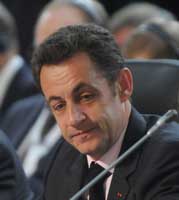Nicolas Sarkozy, France's newly elected president, takes office on May 16. Not for the French a two-month transition following elections, as in the United States. He will then announce a prime minister and a government that could remain in office for less than a month -- if French voters decide to balance a conservative presidency by voting for the Socialist Party in the upcoming parliamentary elections in June. However, the prevailing view in Paris is that Ségolène Royal's defeat in the presidential run-off has left the socialists bruised and weakened. Sarkozy's party, the Union for a Popular Movement, therefore, stands a good chance of making a clean sweep, thus strengthening the new president's mandate for change. "What's fascinating about Sarkozy is not his commitment to change, but can he succeed in doing it?" mused Philip Gordon, the specialist in French politics at Washington's Brookings Institution shortly before round two of the elections. In victory, it remains the key question.
No U.S.-Style Transition in France: Sarkozy Starts Work Next Week

